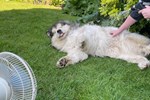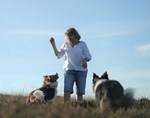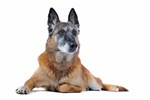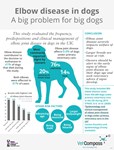Search - News & Events
11 - 20 of 677 results
-
RVC researcher receives grant for a project analysing shape change in horse’s backs during walking and trotting
A lecturer and early career researcher at the Royal Veterinary College (RVC) has been awarded a grant to carry out research exploring the shape change in horse’s backs during walking and trotting. This research aims to identify where saddles should … -
The RVC urges owners of hot dogs to “cool first, transport second”
A new study by the VetCompass team at the Royal Veterinary College (RVC) has found that dogs with heatstroke may be suffering even further due to outdated first aid practices. The research calls for updated guidance to be promoted more widely for … -
Study reveals substantial negative impacts on owners’ lives when their dog develops epilepsy
The qualitative study, led by the RVC, explored the impact of owning a dog with epilepsy, aiming to provide better support and resources to help improve owner quality of lifeA study led by the Royal Veterinary College (RVC), which explored the impact of owning a dog with …
-
New RVC research reveals how pet ferret owners’ awareness of animal boredom can impact their pet’s welfare
New research from the Royal Veterinary College (RVC) has revealed the extent to which pet ferret owners are aware of and understand ferret boredom. The study found that, although most owners believed their ferrets could experience boredom, owners …New research from the Royal Veterinary College (RVC) has revealed the extent to which pet ferret …
-
New RVC study into euthanasia of dogs aims to help veterinary professionals and owners better prepare for that toughest decision
The discoveries in this new study can support veterinarians and owners to better prepare for and come to terms with such difficult decisions -
RVC study into canine epilepsy helps owners identify triggers and predict seizures before they happen
An important step in helping dog owners to have advance warning of seizures, but also to identify the triggers that can be avoided to help reduce the number of seizures their dog experiencesAn international study, which recruited owners of dogs diagnosed with epilepsy, has revealed …
-
Love is blind? Many owners of short-muzzled dogs are strongly bonded to their pets but unaware of health problems
Love is blind? Many owners of short-muzzled dogs are strongly bonded to their pets but unaware of health problemsThe largest study to date on the owners of short-muzzled dogs reveals close bonds between them and …
-
The RVC invites dog owners to participate in the largest study of autoimmune diseases ever conducted
The Royal Veterinary College (RVC) is calling for owners of dogs in the UK with autoimmune diseases to take part in a vital piece of new research, which aims to gather data and insight into the diagnosis, treatment response and outcomes of these dogs. This information will then be shared with local veterinary practices and specialist hospitals to help owners and vets make well-informed decisions when dogs are diagnosed with one of these conditions.The Royal Veterinary College (RVC) is calling for owners of dogs in the UK with autoimmune diseases …
-
New RVC research helps owners better understand the remaining life expectancy of dogs
New research from the Royal Veterinary College’s (RVC) VetCompass programme now enables owners to predict the remaining life expectancy of their dog from different ages, with results broken down by breed and gender to make these as useful as possible for owners of many breeds in the UK. The findings also identify breeds with the greatest and lowest life expectancies of the 18 breeds in the study, highlighting wide differences in life expectancy amongst popular breeds. -
World’s largest elbow disease study helps owners of large-breed dogs
The Royal Veterinary College (RVC) has just completed the largest ever study of elbow disease in dogs attending first opinion veterinary practices in the UK. The results have highlighted which breeds are most at risk in order to assist owners to be alert for the signs of this condition and to seek veterinary treatment early.










